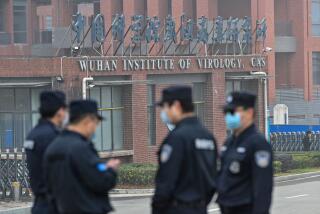‘Dirty bomb’ plot unlikely
- Share via
WASHINGTON — U.S. officials expressed concern Thursday over charges that the Colombian rebel group the FARC was seeking ingredients for a radioactive “dirty bomb,” but said the material discovered this week poses little danger.
Even as they downplayed the threat from about 66 pounds of degraded or depleted uranium Colombian officials said they found and had linked to FARC guerrillas, the U.S. officials said they were not dismissing Bogota’s claim that the rebel group intended to procure deadly weapons.
“I think you have to take at face value what the Colombians are saying,” said a senior U.S. intelligence official, who, like others, spoke on condition of anonymity when discussing intelligence assessments. “There’s no reason at this point to think they’re making this up.”
But the officials said the material appeared to be an easily obtained kind of uranium that poses little, if any, health hazard.
State Department spokeswoman Heidi Bronke said U.S. officials had so far heard only initial reports of the seizure from Colombian officials, and understood from them that it was depleted uranium.
She said that U.S. officials didn’t know how the rebel group, the Revolutionary Armed Forces of Colombia, intended to use the material, but hoped that Colombian authorities would be able to determine that through their investigation of laptop computers and other evidence seized in a March raid that killed a top FARC commander.
Depleted uranium is not sufficiently radioactive to be suitable for a device that could be used as a dirty bomb, said Charles Ferguson, a nuclear affairs specialist at the Council on Foreign Relations.
Such devices are intended to spread highly radioactive material over a large area to cause contamination and panic.
A bomb made with depleted uranium might “have panicked people for a little while, but the alarm wouldn’t have lasted” once the public realized that the health threat was negligible, he said.
Colombian forces crossed into Ecuador in the March 1 raid, killing FARC second in command Raul Reyes and seizing laptop computers and other evidence. According to the Colombian government, the laptops contained e-mail and other indications of efforts by the FARC to buy and sell uranium, as well as shoulder-fired missiles from Libya, and to blow up pipelines and commit other illegal acts.
U.S. authorities have been seeking an independent review and authentication of the laptops’ contents, and the U.S. House Foreign Affairs Committee has asked Colombian National Police commander Oscar Naranjo for a briefing.
Some analysts have cautioned that information described by Colombians as being taken from the laptops could be part of a government disinformation program to buttress its charges against the FARC and thereby discredit Ecuador and Venezuela, which criticized the government in Bogota for the cross-border raid.
However, the senior American intelligence official said U.S. intelligence agencies believed that at least some of the the laptops’ reported content was likely to be authentic.
“I think the intention or aspiration may be true” on the part of the FARC to obtain uranium, said the senior intelligence official. “I don’t think there’s any evidence they ever got it, and don’t know that they would know what to do with it if they did.”
The seized material was “depleted, not enriched,” the official added. “So what’s the use of that other than irritating people?”
Another senior U.S. official speculated that the FARC was the victim of a hoax in which the group was offered an easily obtainable form of uranium, usually worth $100 a pound, at a much higher price.
In an e-mail purportedly found on one of the laptops, a FARC commander said he had contacts in Bogota who “propose to sell each kilo for $2.5 million,” or about $1 million a pound, according to accounts in the Colombian media.
“The real story is the very fact that the FARC is looking for uranium, even if they got scammed this time,” said the second senior U.S. official, who works in Congress on Colombian issues. “The very fact that they are out there looking for it is troubling.”
--
paul.richter@latimes.com
greg.miller@latimes.com
Times staff writers Peter Spiegel in Washington, Maggie Farley at the United Nations and Chris Kraul in Bogota contributed to this report.
More to Read
Sign up for Essential California
The most important California stories and recommendations in your inbox every morning.
You may occasionally receive promotional content from the Los Angeles Times.









